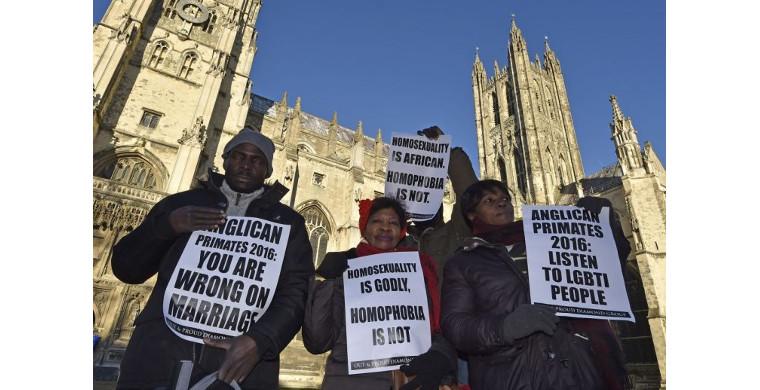The unfolding Anglican earthquake: a way through?
(Photo: Gay rights campaigners protest in the grounds of Canterbury Cathedral in Canterbury during the Anglican Primates meeting earlier this year.)
By David Baker
www.christiantoday.com
17 Sept. 2018
Can Anglicans ever compromise on the vexed issue of sexuality? And if not, is there now a possible way forward?
Many still hope for some kind of compromise. After all, Christians of various denominations disagree amicably on many other things -- such as re-marriage of divorcees in church, or whether to baptise children, for example.
But that's probably wishful thinking. That's because the issue of sexuality is different from many others on which Christians have varying practices. Nobody believes, for example, that baptism is a 'bad thing' or that divorce is in and of itself a 'good thing'. The range of practice in relation to each issue does not reflect underlying differences on the rights or wrongs of the thing under discussion itself. For all Christians, baptism is a matter for rejoicing, whereas divorce is sad.
With sexuality, it's different. One part of Anglicanism believes non-celibate same-sex relationships should be celebrated. Another part -- by far the majority -- believes there is a better story for Christians to tell, and that it doesn't involve jettisoning 2,000-year old beliefs about the uniqueness of male-female marriage and chastity outside that. For each side, compromise is impossible.
For 'liberals' that would involve what they would see as the continuing oppression and repression of gay and lesbian people. For 'conservatives' it would be selling out on a 'salvation issue' affecting people's eternal destiny and undermining the faithful self-denial of celibate same-sex attracted Christians. Compromise would go against the conscience of each side, and indeed would threaten the internal consistency of either point of view.
So, is there any way forward other than conflict? Well, there is now at least one proposal on the table. It comes from the chair of the Anglican network GAFCON, Archbishop Nicholas Okoh. A few days ago, he proposed a 'structural separation' between churches in New Zealand that hold traditional beliefs on sexuality and those that accept same-sex marriage. It would, he said, be a strategy that accepts 'the reality of irreconcilable differences about the nature of the Bible and the gospel, but calls for it to be done peacefully' -- and without the endless court battles blighting Anglicanism elsewhere.
It is a shrewd move, the logic of which is hard to fault. And it throws up questions for many in Anglican leadership, not least in England. Here, fault lines just as deep as those in New Zealand and US are apparent, as is shown with current controversy over a proposed 'Rainbow Eucharist' at Wells Cathedral which has been roundly condemned by conservatives. So what challenges and opportunities does the GAFCON plan bring?
1. It's an olive branch for Justin Welby. As Archbishop Okoh wrote of his proposal: 'In practice much will depend on the attitude of the Archbishop of Canterbury.' The GAFCON proposal is a peaceful way forward -- and he should take it. It's been bad enough seeing endless court battles among American Episcopalians. Does he really want that same scenario unfold elsewhere round the world? If he's been praying for a way forward, maybe this is his answer.
2. It's a wake-up call for Anglican evangelical bishops. I have lost count of the number of times I have come across Anglican evangelical clergy who express perplexity and frustration that, while liberal bishops in the Church of England seem to advance their agenda boldly, many (if not all) Anglican evangelical bishops appear as timid as dormice about sexuality. There are some high-profile diocesan bishops whose reticence baffles many. Archbishop Okoh's proposal is a wake-up call for them to realise what could unfold in Britain soon -- and that whether it does nor not might depend on what they say. Can they find the courage to speak out clearly in public for what, in private, many of them believe?
3. It's a spur for Anglican evangelical unity. This week, the more conservative section of Anglican evangelicals meet for their annual ReNew conference. They themselves have different opinions about the future of the CofE: some advocate a 'stay and fight because the battle is not lost' approach, while others believe that 'it's all over bar the shouting' -- and are looking to leave the denomination. And the ReNew conference is itself only one segment of the total Anglican evangelical constituency, which comes together under the Church of England Evangelical Council (CEEC). For that council, the question is whether Archbishop Okoh's plan is effectively identical to their own previously-announced blueprint for 'visible differentiation' in the future between liberal and conservative Anglicans, should the C of E change its tune on sexuality. If that plan and that of Archbishop Okoh overlap, could it help generate much needed unity among fragmented Anglican evangelicals?
At the end of the day these are not abstract questions. These issues affect thousands of ordinary Anglican parish clergy such as me, our churches, and our unchurched friends and neighbours. So we look to those who lead us to do just that: to lead. Will we end up in an 'Alice in Wonderland' world of pick-and-mix faith, or disappear down a rabbit hole of litigation -- or just be able to get on with making Jesus known? Much will depend on what our leaders now decide.
David Baker is a former daily newspaper journalist now working as an Anglican minister in Sussex, England.














